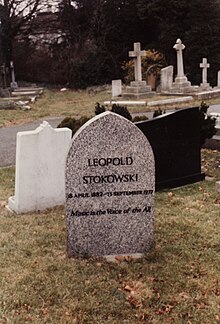Leopold Stokowski
Leopold Anthony Stokowski (born April 18, 1882 in London , England , † September 13, 1977 in Nether Wallop , England; actually Leopold Antonin Stanisław Bolesławowicz Stokowski ) was an English-American conductor and arranger of classical music .
Life
Private
Stokowski made a secret of his parentage and year of birth and claimed u. a., he was born in Krakow, Poland . His father was Polish, his mother Scottish (not, as is often claimed, Irish). He was baptized after his Polish grandfather Leopold .
Stokowski was married three times, until 1927 with the pianist and pedagogue Olga Samaroff , until 1938 with Evangeline Johnson , whose father was one of the founders of the pharmaceutical company Johnson & Johnson and with whom he had two daughters Sadja and Luba, most recently with the actress Gloria Laura Vanderbilt . In 1937/38 he was close to Greta Garbo .
The German actor Oliver Stokowski is his great-grandson.
Career and artistic nature
Originally an organist , Stokowski became one of the most successful conductors of the 20th century, despite numerous arguments with orchestra boards. From the age of fourteen he studied at the Royal College of Music in London, a. a. with Hubert Parry and Charles Villiers Stanford , received a Bachelor of Music at Queen's College in Oxford in 1903 and completed his training later in Berlin, Munich and Paris. He was organist and choir director in London and New York and made his debut in Berlin in 1908. He made his breakthrough in 1909 as the conductor of the Cincinnati Symphony Orchestra . He gave over 7000 concerts and directed more than 2,000 world premieres. He was unusually strong in promoting the dissemination of the works of contemporaries.
During his life he also made a name for himself as an editor of works a. a. Hector Berlioz ', but above all Johann Sebastian Bach , z. B. the song Come, sweet death or the famous Toccata and Fugue in D minor BWV 565 for organ, which he helped to overwhelmingly effect in the large orchestra garb. In 1969 he conducted his orchestral transcription of Bach's Passacaglia and Fugue in C minor BWV 582 with the Saarbrücken Radio Symphony Orchestra in a television recording for the ARD program .
Celebrated as a “sound magician” and reviled for his interventions in the musical text or the original orchestral setup, he developed his own, very typical orchestral sound over the decades. This was based on the fact that he allowed the orchestra musicians individual freedom, be it the bowing of the strings or the breathing in the winds. He conducted hands-free without a baton , experimented with dramatic lighting effects and became famous for theatrical gestures, such as throwing the score on the floor at occasional performances to show that he did not need it. He became a legend through his participation in Walt Disney's film Fantasia .
The pianist Glenn Gould called Stokowski one of the few conductors he admired and recorded Ludwig van Beethoven's 5th piano concerto with him.
On the subject of “What is a conductor anyway?” He once remarked: Why do conductors and generals get so old? Perhaps it is for the pleasure of imposing one's will on others.
Sound recording
Stokowski made over 700 sound recordings between 1917 and 1977 and influenced u. a. technical developments in stereophony and recordings on long-playing records .
Afterlife
In 1979 the Leopold Stokowski Society was founded. She has made it her task to keep alive the memory of Stokowski's life's work as well as to preserve and republish his numerous music recordings.
Honors
In 1927 he was honored with honorary membership by the London Royal Philharmonic Society . In 1977 he was awarded the Grammy Trustees Award for his achievements in music , together with Thomas Edison .
Film appearances
- 1936: The Big Broadcast of 1937
- 1937: 100 men and one girl
- 1940: Fantasia
- 1947: Carnegie Hall
- 1999: Fantasia 2000 ; a sequence from Fantasia 1940 ("The Sorcerer's Apprentice" with Mickey Mouse as the main actor) was repeated
Fonts (selection)
literature
- Herbert Haffner: Genius or Charlatan? The exciting life of Leopold Stokowski. Parthas Verlag, Berlin 2009, ISBN 978-3-86964-013-6 .
Web links
- Biography (English)
- Leopold Stokowski in the Internet Movie Database (English)
- Greta Garbo and Leopold Stokowski experience a mutual romance in Italy ...
Individual evidence
- ↑ a b c d e f g h i j k Leopold Stokowski. Maestro Celebre. Antonin Dvorak - Jean Sibelius - Hector Berlioz - Georges Bizet - Camille Saint-Saens - Eric Satie . Compact disc . Booklet. Trumpets of Jericho Ltd., no year, p. 6
- ↑ dradio.de v. March 23, 2007
- ↑ a b Leopold Stokowski. Maestro Celebre. Antonin Dvorak - Jean Sibelius - Hector Berlioz - Georges Bizet - Camille Saint-Saens - Eric Satie . Booklet. Trumpets of Jericho Ltd. No year, p. 4
- ^ Leopold Stokowski. Maestro Celebre. Antonin Dvorak - Jean Sibelius - Hector Berlioz - Georges Bizet - Camille Saint-Saens - Eric Satie . Compact Disc. Table of contents on the back. Trumpets of Jericho Ltd., no year
- ^ Die Zeit , Zeit Geschichte No. 1 2008, p. 46.
- ^ List of honorary members of the RPS 1900-1949
| personal data | |
|---|---|
| SURNAME | Stokowski, Leopold |
| ALTERNATIVE NAMES | Stokowski, Leopold Anthony (full name); Stokowski, Leopold Antonin Stanislaw Boleslawowicz (full name) |
| BRIEF DESCRIPTION | English conductor |
| DATE OF BIRTH | April 18, 1882 |
| PLACE OF BIRTH | London , England |
| DATE OF DEATH | September 13, 1977 |
| Place of death | Nether Wallop , Hampshire, England |

